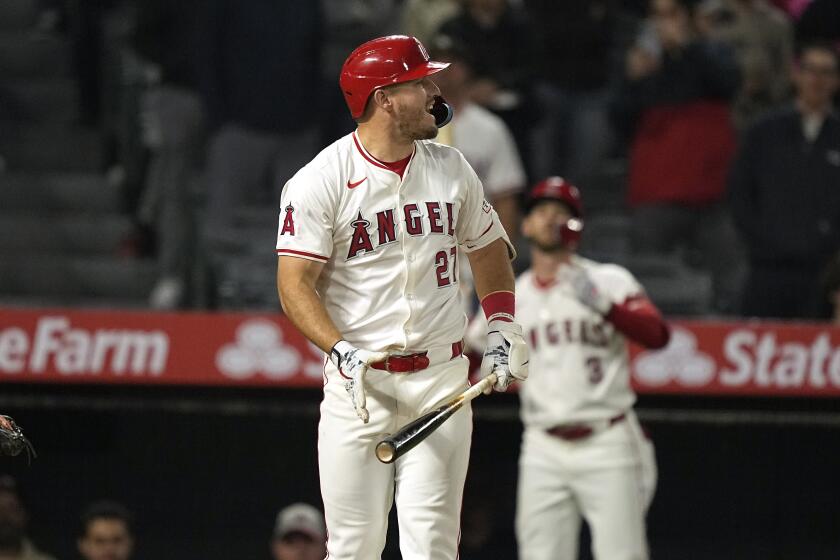One athlete who didn’t just talk about giving back
Thirty years ago this month, Lyman Bostock made a move so outrageous and uncharacteristic for a professional athlete that, had the Angels outfielder not been fatally shot five months later, baseball fans might still talk about it.
If not for the tragic way his life ended -- in the wrong place at the wrong time, cut down in his prime -- they might say it was his crowning glory.
In April 1978, Bostock offered to forfeit his salary.
Mired in a horrendous slump after signing a rich free-agent contract with the Angels in November 1977, the former Cal State Northridge and Manual Arts High star told owner Gene Autry, in essence, he didn’t deserve to be paid.
“Today,” says Dick Enberg, the Angels’ announcer back then, “I think we’d all need to be slapped around to wake up if somebody took a step like that.”
But this was no stunt.
“What you saw is what you got from Lyman,” Bob Hiegert, who coached Bostock at Cal State Northridge, says of his principled former player. “There was nothing hidden about Lyman. He wore his heart on his sleeve.”
Son of Lyman Bostock Sr., who played in the Negro Leagues with the Brooklyn Royal Giants and the Birmingham Black Barons, Bostock was 27 and seemingly just reaching his athletic prime when he signed with the Angels. In the last two of his three seasons with the Minnesota Twins, he had hit .323 and .336, finishing among the American League batting leaders each year.
The Angels, winners of a bidding war with the New York Yankees and San Diego Padres, signed him for the then-shocking sum of $2.25 million for five years.
“I think he was offered one of the richest contracts in pro sports and he didn’t feel comfortable about it,” says Hiegert, who stayed in contact with Bostock after Bostock turned pro. “He was almost embarrassed.”
Imagine his emotional distress at the end of his first month with the Angels, when he was batting .147 and buried in a two-for-38 slump.
Pressing, Bostock told reporters he was “hallucinating” at the plate, noting, “I felt myself standing outside my body up there . . . then jumping back into it just before the pitch. Everything was just a big glare in front of my face.”
Midway through the slump, he made his offer to Autry.
“He couldn’t hit a solid foul ball,” recalls Enberg, adding that he and Bostock felt a kinship because Enberg also had spent time at Cal State Northridge -- as an assistant baseball coach in the early 1960s.
“He was embarrassed by his performance and wanted desperately to do well. He just felt that he was shortchanging Gene Autry and he said, ‘Don’t pay me.’ There’s no question it endeared him to the fans at a time when the fans were unhappy that he wasn’t hitting.”
Autry, through general manager Buzzie Bavasi, declined the offer. Baseball regulations also would have forbidden it, but Bavasi appreciated the gesture.
“He came into my office and told me he was reluctant to take his salary,” Bavasi recalled 10 years later. “He said, ‘I’m not doing my job.’ But I told him, ‘I won’t let you do that.’ And he says, ‘Why not?’ So I told him, ‘What if you hit .600 next month? You’re sure as hell not getting any more money out of me.’ ”
Unmoved, Bostock donated a month’s salary to charity.
Five months later, Bostock’s poor start and magnanimous offer to Autry were all but forgotten as the Angels entered the final week of the season.
Earl Weaver, manager of the Baltimore Orioles, had predicted Bostock would win multiple batting titles. After a game at Chicago on Sept. 23, he was batting .296.
That night, Bostock met a woman named Barbara Smith during a dinner party at his uncle Ed Turner’s home in Gary, Ind. Later, he and Turner were giving Smith and her sister a ride to the sister’s home when Leonard Smith, Barbara’s estranged husband, pulled up alongside Turner’s car and gave chase. When traffic forced both cars to stop, Leonard Smith stepped from his vehicle with a small-gauge shotgun and fired a single shot into the back seat of Turner’s car.
Barbara Smith was wounded in the neck by one shotgun pellet, but the brunt of the blast caught Bostock in the right temple.
Less than three hours later, he was pronounced dead.
Leonard Smith, tried twice and found “not responsible by reason of insanity,” spent seven months in an Indiana state mental hospital and was released June 19, 1980, less than two years after Bostock’s shooting.
So controversial was the case that it led the Indiana Legislature to change its homicide laws, but that meant little to anyone who knew Bostock.
His legacy, they say, is the integrity he revealed in April.
“I thought it was very honorable,” says Lemuel Bostock, a half brother living in Birmingham, Ala., where Lyman was born and his father died three years ago. “But our father was the same way: If somebody asked you to do a job and you couldn’t perform, you felt like you were getting something you didn’t deserve.
“I knew my father a whole lot better than I knew Lyman, but I could understand where he was coming from because our father was the same way.”
--
More to Read
Go beyond the scoreboard
Get the latest on L.A.'s teams in the daily Sports Report newsletter.
You may occasionally receive promotional content from the Los Angeles Times.




